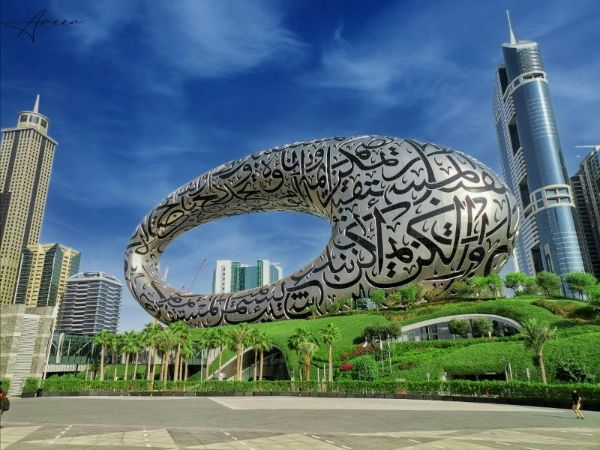Call for Papers out now! ICOM Dubai November 2025
June 9, 2025
We are pleased to announce that the Call for Papers section of the ICOM Dubai 2025 website is open: https://dubai2025.icom.museum/call-for-papers. Even if you are not planning to present a paper this is how you should register to join us on the DESIGN IC Day site visits. ICOM Dubai will be held 11–17 November 2025 at the Dubai World Trade Centre.
There will be three ICOM DESIGN sessions held at the Dubai General Conference and one IC Day of site visits:
- A-10 (DESIGN (ICDAD), GLASS) - Adornment and Identity (12th November 2025, 1.5 hours)
- B-7 (or BC-7) (DESIGN (ICDAD), DEMHIST) - Adornment and Identity in Spatial Design and Objects (12th November 2025, 1.5 hours)
- C-7 (COSTUME, DESIGN (ICDAD)) - Adornment and Identity (13th November 2025, 1.5 hours)
- IC Day - Dubai’s Decorative Arts, Design, and Intangible Heritage (15th November 2025, all day)
DEADLINE FOR SUBMISSIONS: JUNE 22, 2025
For more information on the sessions' topics and application, please click here.
Save the Date: ICOM–DESIGN International Symposium and Post-Symposium Tour in Oslo, Norway, 28 October–1 November, 2025
May 10, 2025
Photo: National Museum of Art, Architecture and Design, Oslo. Image courtesy of Nasjonalmuseet
In addition to its Annual Conference in Dubai, ICOM–DESIGN is also organizing a separate 2025 International Symposium on the theme of “Collection Displays Reassessed” at the new National Museum of Art, Architecture and Design, Oslo (Nasjonalmuseet), 28–30 October, 2025. This program, organized by Nasjonalmuseet Senior Curator and ICOM–DESIGN board member Dr. Denise Hagströmer, will be followed by a special post-symposium tour to local destinations 30 October–1 November. Stay tuned for more information to come!
Save the Date: ICOM Dubai 2025 General Conference, 11–17 November 2025
May 10, 2025
 Photo: Museum of the Future, Dubai
Photo: Museum of the Future, Dubai
Join ICOM–DESIGN for our 2025 Annual Meeting at the World Trade Centre, Dubai, during ICOM’s triennial General Conference, 11–17 November 2025. Find more information on their newly launched website: https://dubai2025.icom.museum/
The overall theme of ICOM Dubai is “The Future of Museums in Rapidly Changing Communities,” with three subthemes: “Intangible Heritage,” “Digital Technologies,” and “Youth Power.”
ICOM–DESIGN is planning three separate joint sessions with the international committees GLASS, COSTUME, and DEMHIST on the theme of “Adornment and Identity,” with slight variations depending on the partnering committee. We will also have a specially organized DESIGN IC Day of touring museums and other sites in Dubai of relevance to decorative arts and design professionals. Look for a Call for Papers on this topic in the coming weeks. Presentations will likely be relatively short, 10–15 minutes, and should relate to “Adornment and Identity,” hopefully in the context of one of the conference subthemes. Deadline for CfP submissions is 15 June 2025 unless otherwise stated on the Dubai website. Please submit your proposals through the General Conference portal: Shaping the Future of Museums and Heritage | ICOM Dubai 2025. We will also send out a mailing to ICOM DESIGN members and members of interest as soon as the ICOM Dubai 2025 CfP registration is open.
New ICOM DESIGN Publication “Ornament,” Now Available Online!
May 10, 2025

Thanks to the hard work of our former board member Maria José Gaivão Tavares and her team, we are proud to announce the publication of an online book Ornament containing 13 papers by colleagues from the 2023 ICDAD (now ICOM DESIGN) Annual Conference at the Palácio Nacional da Ajuda in Lisbon. It is available at this link.
ICOM–ICDAD Has Become ICOM–DESIGN!
May 10, 2025

We are delighted to announce that, with a majority of votes from ICDAD members and subsequent approval by the ICOM Executive Board, our international committee has officially adopted a new name.
Old name: ICOM–ICDAD
International Committee for Museums and Collections of Decorative Arts and Design
New name: ICOM–DESIGN
International Committee for Decorative Arts and Design
 This change aligns with ICOM’s directive to move away from acronyms to make international committee names more accessible to all members. Since we are part of the International Council of Museums, we have removed “Museums and Collections” from our name to create a simpler, more concise identity.
This change aligns with ICOM’s directive to move away from acronyms to make international committee names more accessible to all members. Since we are part of the International Council of Museums, we have removed “Museums and Collections” from our name to create a simpler, more concise identity.
Despite the prominence of the word DESIGN in our name, our committee continues to uphold its broad purview, encompassing decorative and applied arts—as well as design—across all mediums, from ancient to contemporary, including such topics as product design, the experiences and stories behind objects, interior spaces, historical reconstitution, conservation and exhibition, craftsmanship and techniques, future preservation, and more.